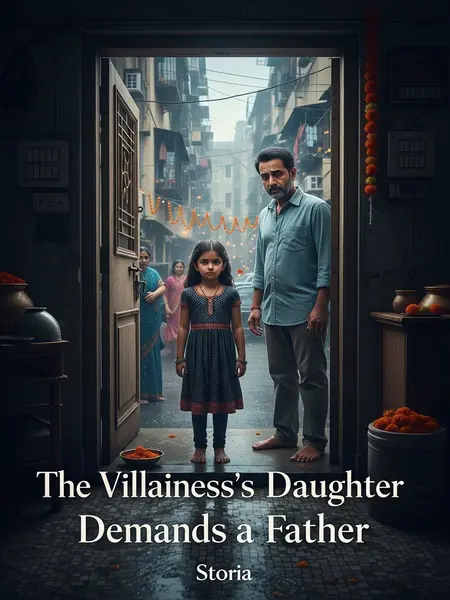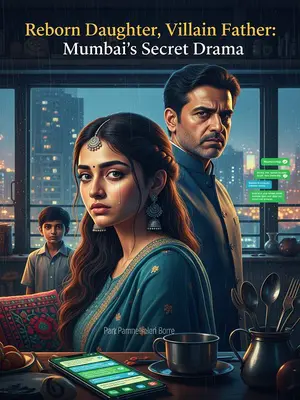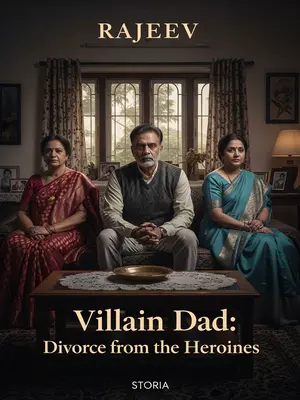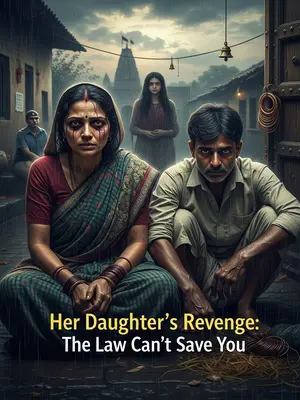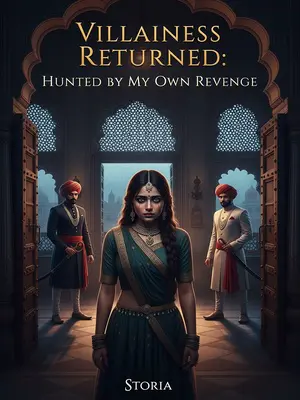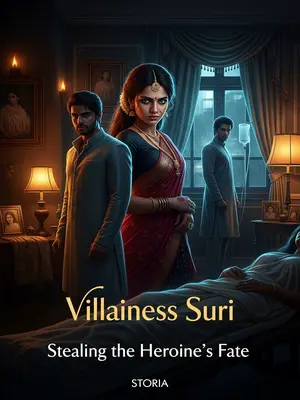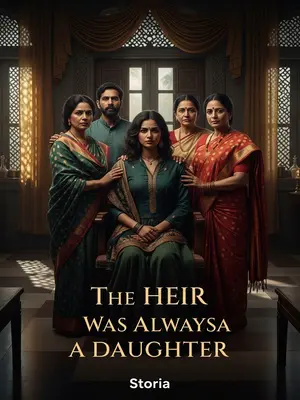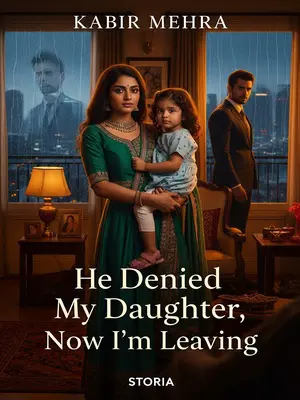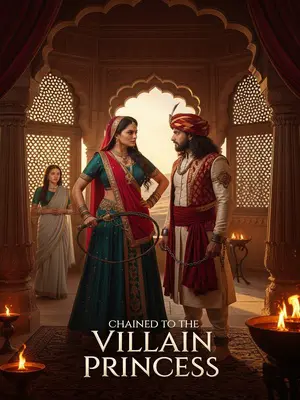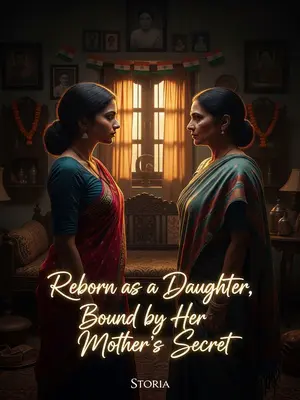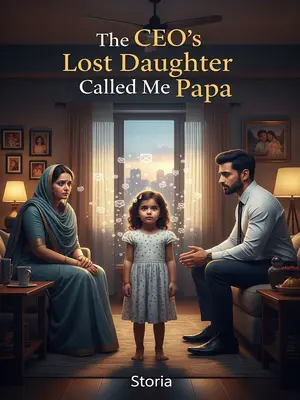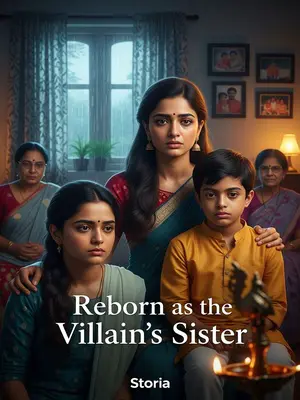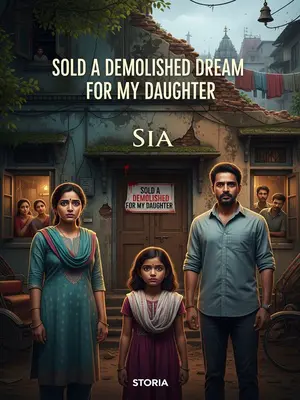Chapter 3: The Villainess’s Daughter
3
What is Papa talking about?
The question chased itself in my mind, as confusing as the big words adults used.
I stared at him blankly. “I didn’t...”
I blinked hard, fighting back tears. It felt like being blamed in front of the whole class for something you didn’t do.
Arjun set the photo frame on the table, his tone icy. “Go back to the Malhotra family. You can’t be my child. I’m not your papa.”
His words hurt more than scraped knees or being forgotten at school.
“But Mum said you are my papa.”
I pleaded, my voice trembling, wishing he’d just believe me once.
“Impossible.” He closed his eyes. “Your mum and I separated eight years ago, but you’re only six. You can only be Vikram’s daughter.”
He spoke with the finality of a judge, jaw set like Dadaji during a family argument.
I counted on my fingers for a long time and realised what he said seemed to make sense.
My brow furrowed in concentration, but confusion only grew heavier in my heart.
Could I really be Vikram’s daughter?
The thought felt like betrayal, my stomach twisting in knots.
But Mum wouldn’t lie to me.
Her voice echoed in my mind: "Always believe in yourself, Anvi."
There must be a misunderstanding.
I chewed my lip, determined to clear things up, just as Amma would want.
“Papa, you can do a DNA test with me. I really am your daughter!”
I hesitated, remembering Amma’s warning: “Never cut your hair on a Saturday, beta. It brings bad luck.” But my desperation outweighed superstition. I winced and painfully plucked a small handful of hair from my head, holding it out with trembling hands—innocence and hope battling fear in my eyes.
Arjun looked at me, his brows furrowing, his eyes softening for a heartbeat before he steeled himself again.
“Achoo!” I sneezed again.
The cold air nipped my nose, making me shiver harder.
Arjun glanced out the window, then down at my thin, shivering figure. “If you want to stay, fine, but only for tonight. Tomorrow, I’ll call the police to send you home.”
His voice was brusque, but a little warmth crept in, as if he couldn’t bear to see me freezing anymore.
Great, Papa finally isn’t kicking me out.
A tiny smile appeared on my lips. I bounced on my toes, a sliver of hope blooming inside.
Arjun went upstairs to prepare a room for me.
I followed behind happily.
“Papa, what kind of person is Mum in your heart?”
I tugged at his sleeve, curious and scared of the answer.
Arjun sneered. “Unfaithful and heartless, greedy and selfish, false and hypocritical.”
His voice dripped with scorn; the words felt too big for my small ears.
Three big words—I only understood the last two.
I wondered if Amma had ever been like the villains in Dadi’s stories at bedtime.
“Papa, is Mum really selfish?”
I looked up, searching for any softness in his face.
“...Children shouldn’t ask so much.”
He reached out, hesitated, then finally ruffled my hair—a quick, awkward gesture, as if unsure how to comfort a child.
I slowed down, a little sad.
My steps faltered, heart heavy with questions too big for me.
I’d always known Amma was the villainess.
Among relatives, whenever someone compared my Amma to others, their voices turned sharp, words heavy with judgement.
Because she was the villainess, everyone disliked her.
No one called us for Holi or Diwali. At weddings, Amma and I sat in the back, ignored.
Mum told me in her original world, her name was Meera and she had brain cancer. Before she died, a strange system found her and asked if she would transmigrate into a novel as the villainess. If she could win the hero’s heart, she’d get a healthy body.
I didn’t really get systems and other worlds. But Amma said, “Life is like a TV serial, beta—sometimes you have to play your role even if you don’t like the script.”
Mum agreed.
She became Meera Sharma—the real daughter of the Sharma family, the true fiancée of Vikram Malhotra.
It was like a Star Plus serial: lost heiress, dramatic reunions, tangled family politics.
Priya was her younger sister, the heroine of the family drama.
Priya always wore the best clothes, her smile dazzling everyone at family pujas.
The daughter loved since childhood—even though not related by blood, how could they send her back to struggle?
People whispered, "Bechari Priya!" at every gathering, as if Amma was a thief stealing happiness.
Mrs. Sharma cried all night and convinced Dadaji to let Priya stay.
The whole Sharma family assembled for a meeting, Dadaji tapping his cane. Amma stood at the edge, face a mask of hope and dread.
Mum never knew what she’d done wrong. But as long as Priya was unhappy, she was blamed.
Aunty would sigh, “If only Meera hadn’t come back, Priya would smile again.” Amma bore it all, pretending not to notice the whispers.
Everyone looked at her with reproach and disdain.
At every family lunch, Amma was served last. She would quietly pick up her steel plate, eyes lowered, and an old servant would slip her an extra roti with a conspiratorial wink.
Though blood, Mum was thin and rough, lacking the shine of a rich family’s daughter.
Her dupatta was plain, her voice too soft, her ways too simple for silk sarees and diamond-studded laughter.
Papa and Mum favoured the heroine. Vikram disliked my mum too.
At functions, Priya sat in the centre; Amma drifted at the mandap’s edge.
After returning to the Sharma family, only Dadaji truly welcomed her.
He called her beta, pressing a coin in her palm at every festival, calling her his little star.
Mum had been an orphan in her old world and longed for a family. Whether former adoptive parents or current Sharmas, she cherished them all.
She would light a lamp for every family member, even those who never spoke to her. Amma believed in keeping her own heart pure.
No matter how hard she tried to please, the plot would not bend.
Sometimes I saw Amma’s eyes cloud with hurt, but she always straightened her shoulders and carried on.
Mum had no choice—if she couldn’t win over Vikram, she would die.
She never told me much about her illness, only that she had a time limit, like the games I played on the phone.
Later, the Malhotra family faced a financial crisis, nearly collapsing. Vikram chose that moment to break up with Priya. Priya cried, and under the care of the second hero, went abroad.
It was all so dramatic, sometimes I thought Amma’s life was being written by someone else.
At that time, Mum’s tech company was growing fast, Series B funding nearly done, but she sold it cheap. She used the money and Dadaji’s inheritance to buy the position of Vikram’s wife.
Every rupee she earned was counted and scrutinised. The day she signed away her company, she sat on the bed and cried, thinking no one saw.
Though Vikram was forced to marry her, his heart was always with Priya. He indulged in pleasures every night, obsessed with women who looked like Priya.
Amma would say with a sad smile, "Some people only love the idea of love, beta."
But the one most like her was still my mum.
I saw Amma’s eyes harden in the mirror, determined not to be anyone’s shadow.
Vikram often kissed Mum angrily, but called out Priya’s name. He even brought women home, making out on their marital bed. Only when Mum was sad did his hatred find peace.
Sometimes Amma sat on the balcony all night, staring at streetlights below, her face unreadable.
Even after I was born, he never cared.
On my birthdays, he sent gifts through a servant. Amma always made up stories about him being busy at work.
Mum’s reaction: Whoever wants this rotten cucumber can have it.
I didn’t get it, but I admired Mum’s attitude.
Amma would say, “Don’t hold on to rotten cucumbers, Anvi. Life is too short.”
On my sixth birthday, the system announced: time’s up—the hero still hadn’t fallen in love, so the mission failed. The punishment was erasure.
She hugged me extra tight that night, her voice shaking as she hummed my lullaby. I could tell she was scared, but she never let me see her cry.
At the same time, hospital results came: terminal brain cancer.
Aunty called it a ‘curse from a past life’, but Amma only smiled and said, “God gives his toughest battles to his strongest warriors.”
The system gave Mum three days.
She marked days on the calendar, her fingers lingering as if trying to slow time.
I remember Mum’s face then: confusion, disappointment, pain, and the deep sadness when she looked at me.
Her eyes shimmered in the candlelight, and when she tucked me in, she pressed her lips to my forehead for a long, long time.
She didn’t keep begging Vikram. She decided to find Papa.
She brushed my hair, dressed me in my neatest frock, and whispered, "We’re going to meet someone special, Anvi."
She asked Papa out many times, but he refused. Her messages went unanswered.
Every day, I watched her check her phone, sighing when it stayed silent.
Finally, that day.
She waited under his office building until the sun went down, her life nearly over.
She stood under the flickering tube-light, shivering, clutching a faded dupatta around her shoulders.
He still didn’t come.
That was the night Amma’s hope quietly died, though she pretended otherwise for my sake.
